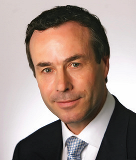AMO 10 Mar 2015 // 2:53PM GMT

Lionel Barber spoke under the Chatham House Rule at the 2015 AMO Communicators’ Night during the World Economic Forum Annual Meeting in Davos. Mr. Barber helped solidify the Financial Times’ position as one of the first publishers to successfully transform itself into a multichannel news organization. He shared some of his views on the state of the news business on-the-record with AMO. The Q&A includes some edited highlights of that conversation.
What is currently driving the evolution of the media landscape?
Increasingly, important news organizations are trying to figure out how they could produce content that people would actually pay for in order to sustain their journalism. At the same time, we are now much more aware of how technology can both change the form of our journalism and allow us to have a much better understanding of our audience, what people are interested in and also to measure how popular some of our journalists are.
So technology could alter which stories are told not just how they are told?
With a paywall, you need to understand what people are reading and what they want. So there is a very important commercial driver as well as an editorial imperative. Some news organizations are finding this difficult because some journalists like to see themselves as the decisive arbiter, but I’m afraid that period is over.
What is the technology strategy at the Financial Times?
At the Financial Times, we are comfortable about adopting data analytics and using technology for our journalism. Over the next 12 months you are going to see some quite important changes in the structure of our news room – we will have people with skills in data analytics and audience development actually working alongside our
journalists. This is still quite a radical step within the media landscape.
How will the media industry continue to evolve?
In the near future, you will see a flight to quality and only a few news organizations that can compete in the print and digital space. It is going to be harder for general news organizations. That will of course offer opportunities for some startups, which may not be profitable yet but are already doing exciting things in terms of how they present the news.
What does that mean for the Financial Times?
We don’t want to be stuck in the muddled middle. We want to be distinctive, and we have a very clear understanding of what makes us different from anybody else: for the Financial Times it’s all about authority and trust, our global reach and our ability to work across sectors and across disciplines.
What topics do you expect to be a focus for the news media in 2015?
First of all, 2014 was definitely the year of the strong man – like Vladimir Putin, Narendra Modi, Xi Jinping, Shinzo Abe, Nicolas Maduro. Will they all have a good year in 2015? I’m not so sure. The falling oil price is really hurting and will weaken many of the strong men. In addition to the oil price, key themes for 2015 will likely include the ongoing transition of the Chinese economy towards more private investment led growth, the outcome of the British elections and monetary policy in Europe, particularly what happens post quantitative easing.

Lionel Barber is Editor of the Financial Times


































.jpg)












